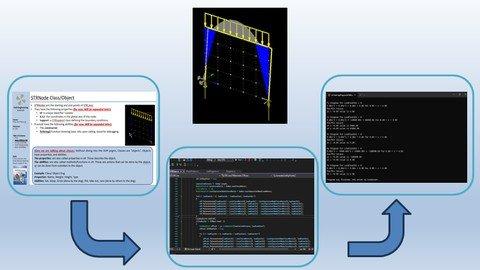Most Commented
Programming The Finite Element Method Using C#





Description material

Published 8/2023
MP4 | Video: h264, 1280x720 | Audio: AAC, 44.1 KHz
Language: English | Size: 8.80 GB | Duration: 14h 45m
Programming the Finite Element Method using C# for Bar Elements
What you'll learn
Understand how to program a post-processor in C# for Bar Elements
Gain the ability to mesh the structural model into a FEM model and apply this in C# for Bar Elements
Master the techniques of programming a FEM calculation in C# for Bar Elements
Understand how to perform effective post-processing in C# for Bar Elements
Requirements
Basic understanding of the Finite Element Method
A basic familiarity with programming concepts such as functions, loops and conditionals would be helpful but is not essential
Description
Hello there, and welcome to the course: Programming the finite element method using C#. This course is a comprehensive online course that will teach you everything you need to know about programming the finite element analysis using c#, and apply those concepts on 3D beam structures.I am assuming in the process that you have some knowledge in the FEM as well as some knowledge about programming in General, and c# in particular. You do not need to be a "pro" in those, but some base knowledge should suffice and is highly recommended.This course is perfect for both beginners and advanced learners. I will teach you everything I know about programming the finite element method, and guide you with engaging content, hands-on exercises. The course covers everything from the inception of the software solution to the debugging sessions.Also worth mentioning, is that your instructor has a PhD in structural engineering and is currently developing his own software to reach market maturity. I will provide you access to the beta test of that program, so that you can see the future possibilities that you can build upon using the basics discussed here. Thus, I am teaching you out of experience.This course is consisted of the following Sections:Section 1 - Program StructureIn this section, the main goals of the course as well as the program structure are laid out and implemented.Section 2 - Structural ObjectsThe structural elements that are inputted by the user are defined, and their roles are explained.Section 3 - Load ObjectsThe different load types (nodal, linear concentrated and linear distributed) are defined and their roles explained.Section 4 - Generation of FEM ModelThe meshing of the structural model into a working FEM model is performed here. Also, FEM objects such as nodes, beams, springs, releases and supports are defined and explained.Section 5 - FEM CalculationsThe generation of the Load Vector, Stiffness Matrix and Boundary Condition Matrix is done here. Also, the solution of the main FEM equation F = kx is done and results are stored.Section 6 - Post ProcessingThe results obtained from Section 5 are used to generate internal force diagrams (normal, shear, bending and torsional).Section 7 - Bench marking and DebuggingWe go through the process of bench marking and bug elimination and learn a couple of lessons from this experience. Also, an outlook is given.Generally,Throughout the course, you'll learn how to perform pre-processing, inputting the structural model, meshing and preparing the FEM model, performing the analysis, and doing debugging. You'll also learn how to perform post-processing to analyze your results and gain valuable insights into your structures.But that's not all. In addition to the video lectures, I'll provide you with the source code of the program in most of the steps as well as any teaching material used during presentation sessions. This way you can learn by practice, and experiment with your own code and compare with mine.By the end of the course, you'll have the skills and knowledge you need to program the finite element method in C# and apply it to your own projects. You'll be able to analyze structures with greater accuracy and efficiency, and gain a competitive edge in your field. Also, you would have the knowledge to go and try develop a tailored software for either your commercial interests or research interest, or even both.So don't wait any longer. Enroll in Programming the Finite Element Method in C# today, and take the first step toward to achieve this goal.Thank you very much, and I will see you, in my course.
Overview
Section 1: Program Structure
Lecture 1 Introductory Presentation
Lecture 2 Implementation in C#
Section 2: Structural Objects
Lecture 3 Introductory Presentation
Lecture 4 Nodes
Lecture 5 Lines
Lecture 6 Vectors
Lecture 7 Local Axis Directions for Structural Lines
Lecture 8 Defining the "Controller"
Lecture 9 Defining the "Structure"
Lecture 10 Materials
Lecture 11 Releases
Lecture 12 Supports
Lecture 13 Sections
Lecture 14 More work on Nodes
Lecture 15 More work on Lines
Section 3: Load Objects
Lecture 16 Introductory Presentation
Lecture 17 Load Cases
Lecture 18 Load Combinations
Lecture 19 Base Loads
Lecture 20 Nodal Loads
Lecture 21 Concentrated Line Loads
Lecture 22 Distributed Line Loads
Section 4: Generation of FEM Model
Lecture 23 Introductory Presentation
Lecture 24 Clearing the FEM Model
Lecture 25 Meshing – Line with Line
Lecture 26 Line Segment Intersection
Lecture 27 FEM Node Generation
Lecture 28 FEM Spring from Supports
Lecture 29 Avoiding Duplication
Lecture 30 Principles of Support and Release Modeling
Lecture 31 Defining and getting FEM Bars
Lecture 32 FEM Bar Properties
Lecture 33 Defining FEM Spring
Lecture 34 Line Discretization – an Introduction
Lecture 35 Sorting Nodes on a Line
Lecture 36 Considering Releases
Lecture 37 Adding FEM Beams
Lecture 38 FEM Beams Properties
Section 5: FEM Calculations
Lecture 39 Introductory Presentation
Lecture 40 Matrix Initialization and the MathNet Library
Lecture 41 Planning Stiffness Matrix Calculation, Transformation and Others
Lecture 42 Local Stiffness of Spring Elements
Lecture 43 From Element Stiffness to Structural Stiffness
Lecture 44 Principles of Beam Local Stiffness Calculations
Lecture 45 A Polynomial Function
Lecture 46 FEM Beam Shape Functions
Lecture 47 Local Stiffness of FEM Beams
Lecture 48 Applying Nodal Loads
Lecture 49 Preparing Equivalent Nodal Load Calculations
Lecture 50 The Local Equivalent Nodal Load Matrix
Lecture 51 Principles of Equivalent Nodal Load Calculations
Lecture 52 Equivalent Nodal Loads from Bar Concentrated Loads (1)
Lecture 53 Equivalent Nodal Loads from Bar Concentrated Loads (2)
Lecture 54 Equivalent Nodal Loads from Bar Concentrated Loads (3)
Lecture 55 Equivalent Nodal Loads from Bar Distributed Loads (1)
Lecture 56 Equivalent Nodal Loads from Bar Distributed Loads (2)
Lecture 57 Principles of Static Condensation
Lecture 58 Performing Static Condensation
Lecture 59 Undoing Static Condensation
Lecture 60 Solving Kx = F
Lecture 61 Storing Nodal Displacements
Section 6: Post-Processing
Lecture 62 Post-Processing General Steps
Lecture 63 Calculating Local Displacement and Forces
Lecture 64 Principles of Internal Load Diagrams Calculation
Lecture 65 Line Key Points
Lecture 66 Cubic Polynomials
Lecture 67 Line Diagrams
Lecture 68 Internal Forces and Reactions
Lecture 69 Generate Line Key Points (1)
Lecture 70 Generate Line Key Points (2)
Lecture 71 Generating Line Diagrams
Section 7: Benchmarking with Cases, Testing and Debugging
Lecture 72 General Debugging
Lecture 73 Cantilever Beam Benchmark (1)
Lecture 74 Cantilever Beam Benchmark (2)
Lecture 75 Cantilever Beam Benchmark (3)
Lecture 76 2D Frame Benchmark (1)
Lecture 77 2D Frame Benchmark (2)
Lecture 78 2D Frame with Internal Hinge
Lecture 79 3D Frame Structure
Civil Engineers interested in developing their own class library to deal with bar elements,Programmers interested in understanding the intricacies of developing FEM solutions,Motivated and passion civil engineers needing a push to follow the path of developing their commercial FEM solutions
Buy Premium Account From My Download Links & Get Fastest Speed.
https://1dl.net/gk6waedosifw/Programming_the_Finite_Element_Method_using_C.part01.rar
https://1dl.net/yr4mp0y0s8sf/Programming_the_Finite_Element_Method_using_C.part02.rar
https://1dl.net/ikzra87nzbw5/Programming_the_Finite_Element_Method_using_C.part03.rar
https://1dl.net/297g3t042di7/Programming_the_Finite_Element_Method_using_C.part04.rar
https://1dl.net/b5hlco79bpf8/Programming_the_Finite_Element_Method_using_C.part05.rar
https://1dl.net/36r9miugyr08/Programming_the_Finite_Element_Method_using_C.part06.rar
https://1dl.net/4n5sjs65zg5r/Programming_the_Finite_Element_Method_using_C.part07.rar
https://1dl.net/un9peg4hkalq/Programming_the_Finite_Element_Method_using_C.part08.rar
https://1dl.net/d3kx0i8m21fg/Programming_the_Finite_Element_Method_using_C.part09.rar
https://1dl.net/kll7e621f1nh/Programming_the_Finite_Element_Method_using_C.part10.rar
https://nitroflare.com/view/F6050B5D3D258CC/Programming_the_Finite_Element_Method_using_C.part01.rar
https://nitroflare.com/view/65E41813F668B0B/Programming_the_Finite_Element_Method_using_C.part02.rar
https://nitroflare.com/view/9CA1E2804A49725/Programming_the_Finite_Element_Method_using_C.part03.rar
https://nitroflare.com/view/7B296E68FD84AFA/Programming_the_Finite_Element_Method_using_C.part04.rar
https://nitroflare.com/view/B9CDACE66CB5D04/Programming_the_Finite_Element_Method_using_C.part05.rar
https://nitroflare.com/view/CE4481689AE47BD/Programming_the_Finite_Element_Method_using_C.part06.rar
https://nitroflare.com/view/2AE51C21BD64839/Programming_the_Finite_Element_Method_using_C.part07.rar
https://nitroflare.com/view/9A7E9BB22728A56/Programming_the_Finite_Element_Method_using_C.part08.rar
https://nitroflare.com/view/EBACE931F51F96C/Programming_the_Finite_Element_Method_using_C.part09.rar
https://nitroflare.com/view/577880087A04A30/Programming_the_Finite_Element_Method_using_C.part10.rar
https://rapidgator.net/file/886e8596c09d03b701167ad0c8e16a9b/Programming_the_Finite_Element_Method_using_C.part01.rar.html
https://rapidgator.net/file/3c83b701eb0726a277c835403dbdea40/Programming_the_Finite_Element_Method_using_C.part02.rar.html
https://rapidgator.net/file/06510811446c84ea6aed17733358cca1/Programming_the_Finite_Element_Method_using_C.part03.rar.html
https://rapidgator.net/file/95a2ded58da67cd61e87db989d1e691e/Programming_the_Finite_Element_Method_using_C.part04.rar.html
https://rapidgator.net/file/cf05fb40f0e0d32c7f8191e9d3117f7d/Programming_the_Finite_Element_Method_using_C.part05.rar.html
https://rapidgator.net/file/1820b53b5e949652f598bd21d0ff360b/Programming_the_Finite_Element_Method_using_C.part06.rar.html
https://rapidgator.net/file/1592ae8d2a9afe871eb45b4c645a1d54/Programming_the_Finite_Element_Method_using_C.part07.rar.html
https://rapidgator.net/file/ba9698c7f11e92bfc7109c413f702309/Programming_the_Finite_Element_Method_using_C.part08.rar.html
https://rapidgator.net/file/89e3be640b61bc031b5ebbbd946a05bb/Programming_the_Finite_Element_Method_using_C.part09.rar.html
https://rapidgator.net/file/ad462a11d6fe02de858a95d1ceabca30/Programming_the_Finite_Element_Method_using_C.part10.rar.html

Join to our telegram Group
Information
Users of Guests are not allowed to comment this publication.
Users of Guests are not allowed to comment this publication.
Choose Site Language
Recommended news
Commented


![eM Client Pro 9.2.1735 Multilingual [Updated]](https://pikky.net/medium/wXgc.png)






![Movavi Video Editor 24.0.2.0 Multilingual [ Updated]](https://pikky.net/medium/qhrc.png)

